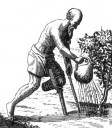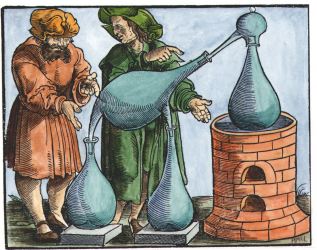| Author | Post |
|---|
adammclean
Member

| Joined: | Fri Sep 14th, 2007 |
| Location: | United Kingdom |
| Posts: | 606 |
| Status: |
Offline
|
|
Posted: Mon Oct 17th, 2011 10:04 am |
|
In alchemy the idea emerged of there being two ways, two paths to the creation of the Philosophers' Stone. One took place in a humid experimental environment and the other by a dry method.
As far as I know this idea emerged in the 16th century and by the 17th century had become an accepted part of the alchemical canon.
Can any confirm this 16th century date, or point to the earliest source for these ideas?
We are essentially looking for the origins of the via sicca and via humida as two separate paths to the production of the Stone.
|
Rafal T. Prinke
Member

| Joined: | Tue Mar 4th, 2008 |
| Location: | Poland |
| Posts: | 150 |
| Status: |
Offline
|
|
Posted: Mon Oct 17th, 2011 01:12 pm |
|
Lawrence Principe in The Aspiring Adept p. 153 suggests that the discovery of "via humida" was attributed to Basil Valentine, while the "via sicca" was the standard traditional way of the "Mercurialist school" traceable back to pseudo-Geber.
There is however the text Via humida: sive Discursus de menstruo vegetabili Saturni among the treatises attributed to Edward Kelley, so if it is really his, it may predate Basil -- and maybe links up to Isaac Hollandus.Last edited on Mon Oct 17th, 2011 01:13 pm by Rafal T. Prinke
|
Paul Ferguson
Member

| Joined: | Fri Feb 15th, 2008 |
| Location: | |
| Posts: | 1538 |
| Status: |
Offline
|
|
Posted: Mon Oct 17th, 2011 03:57 pm |
|
adammclean wrote:
In alchemy the idea emerged of there being two ways, two paths to the creation of the Philosophers' Stone. One took place in a humid experimental environment and the other by a dry method.
As far as I know this idea emerged in the 16th century and by the 17th century had become an accepted part of the alchemical canon.
Can any confirm this 16th century date, or point to the earliest source for these ideas?
We are essentially looking for the origins of the via sicca and via humida as two separate paths to the production of the Stone.
There was a discussion about this on one of your previous discussion fora and someone replied:
"Subject: A0074 Wet and dry ways
Date: Thu, 05 Sep 1996 10:41:00 -0700 (PDT)
From: Bermudez, Pablo
In the last book by Andrea de Pascalis, Alchemy the Royal Art, he mentions
that the wet way is of persian origin, and the dry way attributed to Egypt."
and
"Date: Sat, 07 Sep 1996 22:24:57 +0200
From: Maurizio Nicosia
From Heraclitus' Fragments:
"Pleasure of souls is to become wet" (Fr. 54; Numen. fr. 35; Porph. 'de
antro nymph.' 10)
"The dry soul is the best of all and the most wise" (Fr. 58; Plut. 'de
aud.' 41 a)
"The way up and the way down are One and the same" (Fr. 31; Hippol.
'Refut.' IX 10,4)"
http://www.alchemywebsite.com/afrm0100.html
|
adammclean
Member

| Joined: | Fri Sep 14th, 2007 |
| Location: | United Kingdom |
| Posts: | 606 |
| Status: |
Offline
|
|
Posted: Fri Oct 28th, 2011 03:59 pm |
|
Paul Ferguson wrote:
There was a discussion about this on one of your previous discussion fora and someone replied:
"Subject: A0074 Wet and dry ways
In the last book by Andrea de Pascalis, Alchemy the Royal Art, he mentions
that the wet way is of persian origin, and the dry way attributed to Egypt."
I am not sure I can fully accept Andrea de Pascalis as an authority on this matter. It seems to me that De Pascalis imports some agendas into his view of alchemy. I find the text frustrating as it often presents opinions as historical truths with no sources for these.
|

Current time is 09:35 am | |
|

